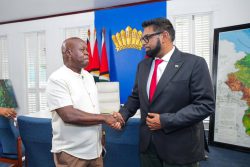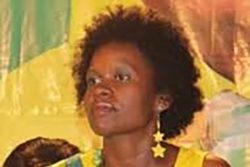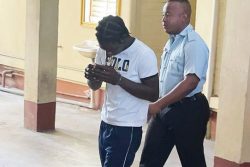Dear Editor,
Last December, with President Maduro at full volume with his jingoistic rhetoric whipping up the Venezuelan masses and his military posturing causing alarm especially here on the Guyana side of the Guyana-Venezuela border, leaders in this Hemisphere, anxious about the potential for any kind of conflict to threaten the Caribbean’s cherished designation as a Zone of Peace, got into full diplomatic damage control. Led by Brazil’s President Lula da Silva, Prime Minister Ralph Gonsalves hosted a high-level meeting attended by both Presidents Ali and Maduro along with other CARICOM Heads of Government and senior representatives of other interested parties, including the United Nations. Resultantly, the Argyle Declaration was concluded, the Region – indeed the world – breathed a collective sigh of relief, the temperature cooled somewhat and the two protagonists were able to maintain an uneasy modus vivendi.
It was touted in the subsequent period that in response to his waning political support domestically, President Maduro might “try a thing” and breach the border or – heaven forbid – launch an even more extensive aerial sortie on our capital, all with the ulterior motive of derailing the election process on the grounds of national security. At the time I was on public record as speculating that Mr. Maduro was either living in isolation – a late CARICOM Prime Minister would have placed him as a resident of Cloud Cuckooland – or at the very least, was oblivious to the concerns emanating from many quarters, including his companeros in Havana. Venezuela’s resident Ambassador had also said last year that an invasion was not going to eventuate.
We are days out from Sunday’s election being held over the border and I have heard of neither a border incursion, nor fighter jets flying overhead. Yet many had
posited that this whole situation was not always conducive to rational thought, and that political desperation has been known to drive leaders to take desperate measures. As it is, President Lula said last Monday that he was ‘frightened’ by President Maduro’s bellicose references to a ‘bloodbath’ and ‘a fratricidal civil war’, which could possibly serve as a push factor for migrants to increasingly stream into neighbouring Brazil, Colombia, Guyana and Trinidad and Tobago. In these similarly precarious circumstances, should not the concern in the Region have been heightened once again, for the Argyle mechanism to be reactivated – it seems to have gone dormant – with another flurry of diplomatic activity, or at the very least an appropriately worded statement, at the instance of either CARICOM or the OAS?
After its conclusion – the Declaration remains unsigned, to the best of my knowledge – I had lamented the fact that a multinational monitoring mechanism had not featured as part of its architecture. Instead it was left primarily to Guyana and Venezuela to chart the course of follow-up action. While I recall a subsequent meeting at the level of their two Foreign Ministers, the two Presidents have not met in any formal follow-up meeting to Argyle.
In fairness to the key players, Prime Minister Gonsalves is understandably preoccupied with the national recovery effort in the wake of the death and destruction from the passage of Hurricane Beryl; so too is the current Chairman of CARICOM, Prime Minister Dickon Mitchell of Grenada. In addition, it may well be the case that any fraternal responses from Venezuela to the tragedies in these two countries could make the initiation of a process towards the issuance of any words of caution on the eve of the elections, an uncomfortable proposition for either of these two gentlemen. After all, rebuilding the lives and livelihoods of their constituents, with assistance and humanitarian aid from any and all quarters, must at this time be priority job one for them.
It must be assumed that Guyana, as one of the parties that was charged with follow-up responsibility since the December meeting, has kept the implementation of the provisions of the Argyle Declaration under what in diplomacy is often referred to as “active consideration”. The border controversy is as existential a threat to Guyana as is the impact of a severe climate event to the OECS countries, in this case Grenada and Saint Vincent and the Grenadines.
One must anticipate therefore that Takuba Lodge has prepared a succinctly-worded draft for consideration of the other Member States and adoption into the Communique at the postponed CARICOM Summit in Grenada, which coincides with the election in Venezuela. Set within the context of Argyle maintaining the Caribbean as a Zone of Peace, the text would ideally speak to the conduct of electoral processes in the Hemisphere – this would in fact kill two birds with one stone – and reiterate that the result and outcome of such elections must be respected and should only be challenged through established constitutional procedures. In other words, no name-calling and innocuous enough to be acceptable to the collective membership.
Sincerely,
Neville Bissember









